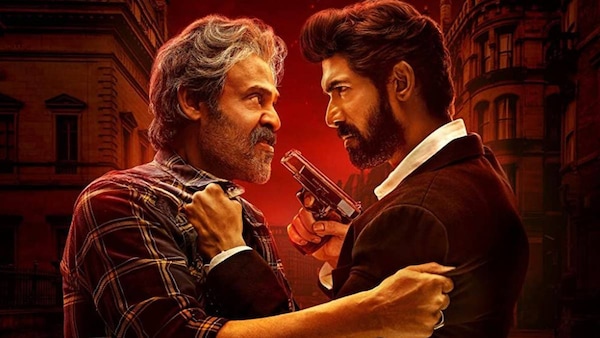Newsletter | Rana Naidu: Foul-Mouthed Men Do Questionable Things

Last Updated: 11.58 AM, Mar 15, 2023
This column was originally published as part of our newsletter The Daily Show on March 15, 2023. Subscribe here. (We're awesome about not spamming your inbox!)
***
IN NETFLIX’s Rana Naidu, there is a scene in which our protagonist moves to open a car door for his wife. “Because I fucked up earlier,” he explains to his wife who melts at the gallant gesture. “Maybe you should fuck up more,” she retorts. It’s hard to read this moment without a hint of irony, but then it’s also painted as a sentimental quackery trying to bring two distanced people together. The fact that merely opening the door for a woman is considered an act of redemption indicates the smug, ignorant world this show is set in. Created by Karan Anshuman and Suparn Verma, the series is an adaptation of the popular Ray Donovan, starring the excellent Liev Schreiber. Rana Naidu, in addition to the original’s provocations, is an exaggerated blast of densely compressed air that does a lot of flailing but rarely lands a meaningful punch.
Rana Naidu, played by the self-serious Rana Daggubati, is a middle-man who handles pesky, off-the-book cases for Mumbai’s elite. The only perceivable problem with that premise is that in a country where institutions reek of corruption and mismanagement, it’s a hard sell to create a character whose only job is to ‘fix’ things. Of course it must be relevant to Mumbai’s finest, but here the show could have used some time to set up the landscape before pinning it with Daggubati’s intense (and somewhat unimodal) mannerisms. Naidu has a difficult relationship with his wife, an ever-committed Surveen Chawla in a role that feels like an echo of her bold career choices of the past. Naidu goes around the city, addressing sensitive situations for politicians, actors, entitled kids et al, and even commands a diverse team of knuckleheads who will pull down doors and clobber semi-naked women for him.
The show’s stakes are internalised to an extent after Naidu’s father, Naga Naidu, played by Daggubati Venkatesh, finishes a prison term and returns to the fold. The rest of the 10-episode series is a battle of egos, an unravelling of the mystery behind Naga’s incarceration and Rana’s reckoning with the moral choices of his job. It sounds good on paper, but the moment these ideas are committed to screen, they swap any semblance of soul for the salaciousness of scandal. There is sex, sleaze and debauchery aplenty, with expletives clamouring for air with the imprecision of a dart that has been fired towards the sky. The extremes to which the series travels to establish shock undermines the narrative’s ability to also conjure humane awe at things more basic — like emotion or relationships.
You know what a show is going for when its first sequence has a woman orally pleasuring a man as a way to obtain his semen. It’s a fairly shocking prologue that sets the tone and then — unfortunately — doubles down on living up to it with as much conviction as the people in the series have a shot at being reflective. Almost everyone is some shade of evil, their sexuality a caveat, and while that might be a worthwhile segue into a world of crime, drugs and more, there is actually little thinking behind the specificity of it all. It’s a question that Rana Naidu, the man and the show, are seldom interested in exploring. Anshuman’s other shows like Mirzapur and Inside Edge handled sexual provocations fairly well, but here the lustiness of an unobservant script feels like an unabashed attempt at reaching for some sort of relevance.
The other problem with Rana Naidu is the Daggubatis. Have two heavyweight actors ever been so riotously wasted together, I wonder. Rana’s character is an ambiguous mix of high morality and garbled delivery, essayed by an actor who cannot seem to distinguish between rage, regret and relief. There is a more than able cast in the supporting bracket with the likes of Chawla, Sushant Singh and Abhishek Banerjee, but the overwrought writing, the inclination to both press the trigger and then bite the bullet, reduces a series that could have maybe used some restraint for a change, to a missed opportunity. Indian sensibilities have probably evolved to the point where they can stomach certain provocations, but without the moat of a humanising story to lift it all, the audacity of it feels insincere.
Expectedly, Rana Naidu has some sharp dialogue and in certain moments does achieve that gleeful teenage sense of euphoria of landing something zany. On the whole, however, the series feels like a slog: a disconnected, rambling assembly of foul-mouthed men doing questionable things. There is nothing wrong in explicitly extending the boundary of what feels like a semi-crystallised version of lewd — at times needlessly red-blooded — ideas. But in Rana Naidu, the chief provocation is the absence of writing that allows, in the midst of its colourful view of sex, drugs and depravity, a resting place for the modesty of actual people.
